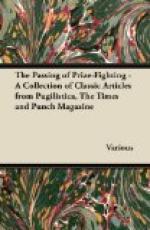“Sailors on horseback!”—the very words bring visions of apoplectic mariners careering madly across sands, three to a horse, every limb in convulsion. Why, it’s one of the world’s stock jokes.
The pathetic part of it is that, obeying the law of opposites, the saddle has an irresistible and fatal attraction for the poor chaps. They take to it on every possible and impossible occasion. You can see them playing alleged polo at Malta, riding each other off at right angles and employing their sticks as grappling irons. You can see them over from the Rock whooping after Spanish foxes, bestriding their steeds anywhere but in the appointed place.
As every proper farmer’s boy has long, long thoughts of magic oceans, spice isles and clipper ships, so I will warrant every normal Naval officer dreams of a little place in the grass counties, a stableful of long-tails and immortal runs with the Quorn and Pytchley.
It was thus with our Mr. MacTavish, anyhow. A stern parent and a strong-armed crammer projected him into the Navy, and in the Navy he remained for years bucketing about the salt seas in light and wobbly cruisers, enforcing intricate Bait Laws off Newfoundland in mid-winter, or playing hide-and-seek with elusive dhows on the Equator in midsummer, but always with a vision of that little place in his mind’s eye.
His opportunity arrived with the demise of the stern parent and the acquisition of a comfortable legacy. MacTavish sent in his papers and stepped ashore for good. He discovered the haven of his heart’s desire in the neighbourhood of Melton, purchased a pig and a cow (which turned out to be a bullock) to give the little place a homely air, engaged a terrier for ratting and intercourse, and with the assistance of some sympathetic dealers was assembling as comprehensive a collection of curbs, spavins, sprung tendons, pin-toes, herring-guts, ewe-necks, cow-hocks and capped elbows as could be found between the Tweed and Tamar, when—Mynheer W. HOHENZOLLERN (as he is to-day) went and done it.
The evening of August 4th, 1914, discovered MacTavish sitting on the wall of his pig-sty, his happy hunting prospects shot to smithereens, arguing the position out with the terrier. He must attend to this war, that was clear, but need he necessarily go back to the salt sea? Couldn’t he do his bit in some other service? What about the Cavalry? That would mean galloping about Europe on a jolly old gee, shouting “Hurrah!” and cutlassing the foot-passengers. A merry life, combining all the glories of fox-hunting with only twenty-five per cent. of its safety—according to Jorrocks.
What about the Cavalry, then? The terrier semaphored complete approbation with its tail stump and even the pig made enthusiastic noises.
A month later MacTavish turned up in a Reserve Regiment of Cavalry at the Curragh as a “young officer.” The Riding-Master treated his case as no more hopeless than anybody else’s and MacTavish was making average progress until one evening in the anteroom he favoured the company with a few well-spiced Naval reminiscences.




